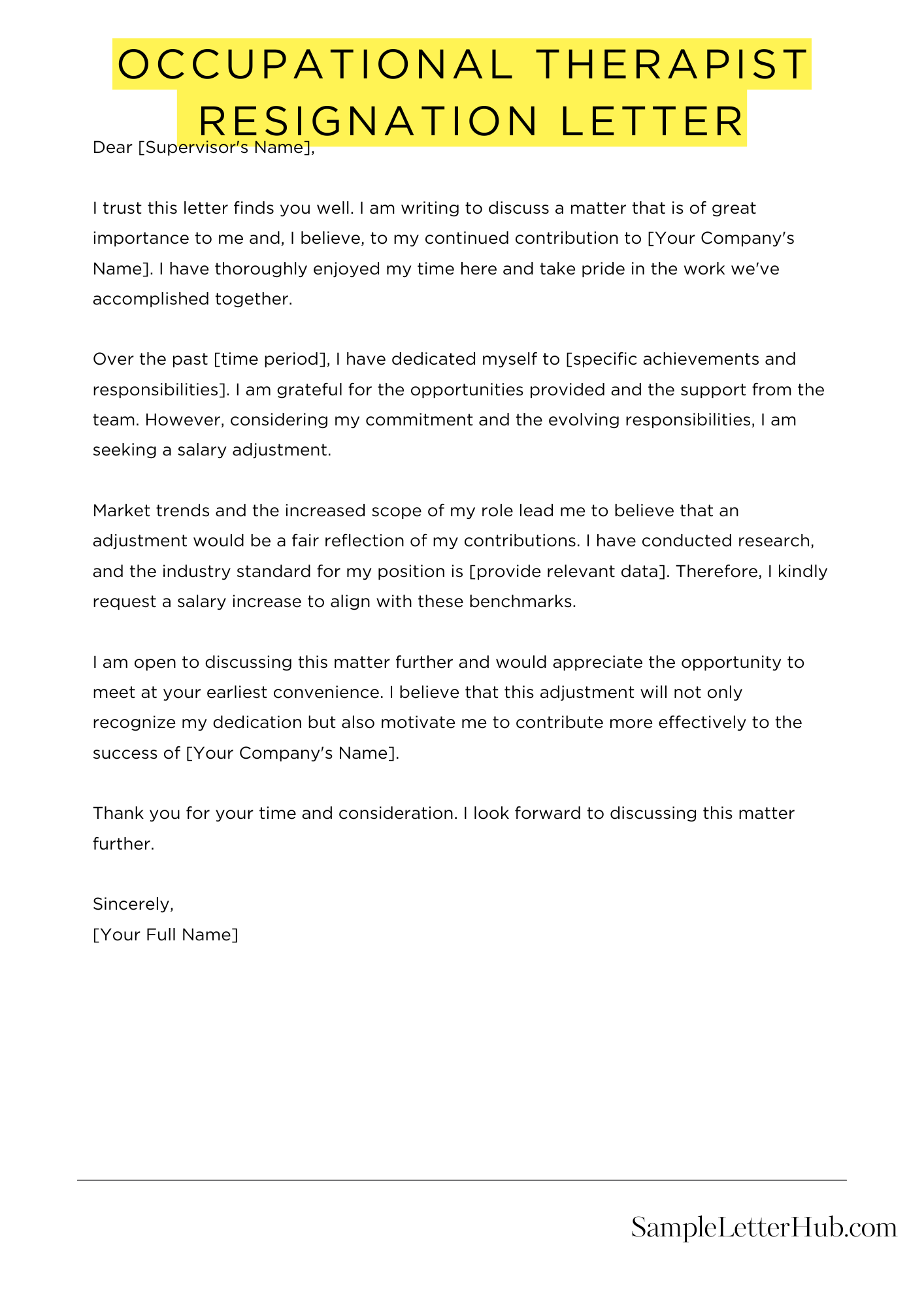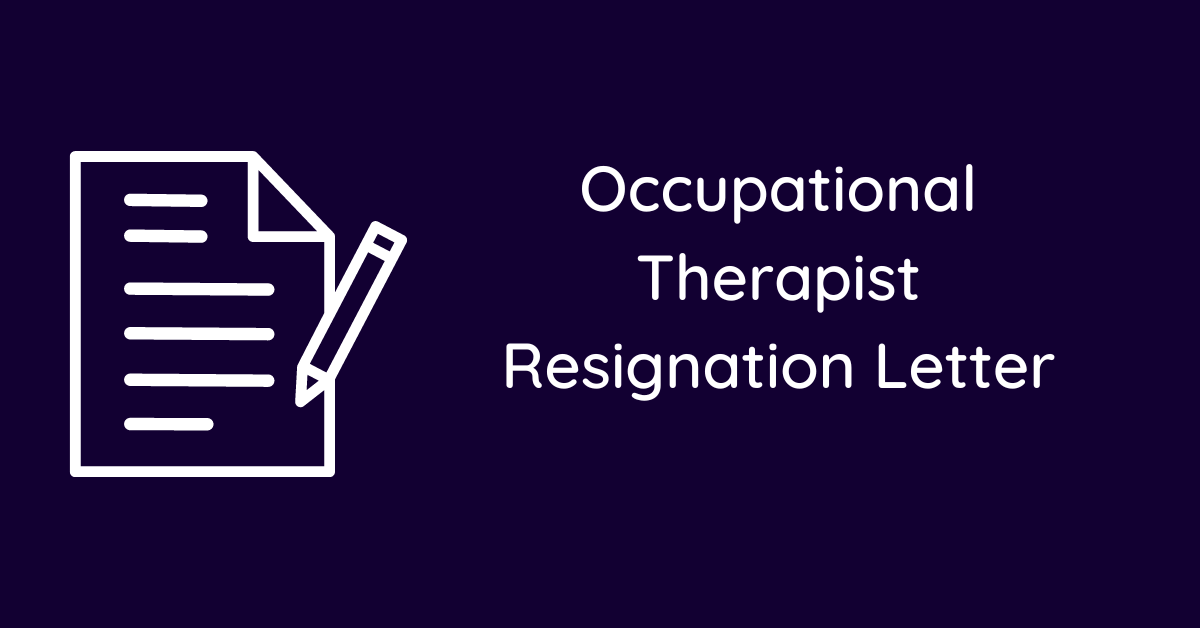Writing an occupational therapist resignation letter can be a daunting task, but it doesn’t have to be. In this article, we’ll share an example of an occupational therapist resignation letter to help you get started.
When it comes to leaving a job, one of the most important things you can do is write a clear and professional resignation letter. This letter should explain your decision to leave, thank your employer for the opportunity to work there, and offer to help with the transition. It’s also important to be polite and humble in your tone.
Below, we’ve shared a template/example occupational therapist resignation letter that you can use as a starting point. Feel free to adapt it to fit your own circumstances.
Occupational Therapist Resignation Letter
Dear [Recipient Name],
Please accept this letter as formal notification that I will be resigning from my position as an Occupational Therapist at [Organization Name], effective [Last Date of Employment].
I have enjoyed my time at [Organization Name] and am grateful for the opportunities and experiences I have gained. I have valued the support and guidance of my colleagues and supervisors.
I wish you and [Organization Name] all the best in the future.
Sincerely,
[Your Signature]
Short Occupational Therapist Resignation Letter Sample
Please accept this letter as formal notification that I am resigning from my position as Occupational Therapist at [Company Name]. My last day of employment will be [Your Last Day]. Thank you for the opportunity to grow and learn during my time here. I wish you and the company continued success. I am happy to assist in the transition process to ensure a smooth handover of my responsibilities.
I wish you all the best with your occupational therapist resignation letter.
When it’s time to say farewell, expressing your gratitude and best wishes can make the transition smoother:

How to Write an Occupational Therapist Resignation Letter
1. Start with a Formal Salutation
Begin your letter with a formal salutation, such as “Dear [Supervisor’s Name].”
2. State Your Intention to Resign
Clearly state your intention to resign from your position as an occupational therapist. Include the date of your last day of employment.
3. Express Gratitude and Appreciation
Express your gratitude for the opportunity to work as an occupational therapist at the organization. Mention specific experiences or individuals that have made your time there meaningful.
4. Offer Assistance with the Transition
Offer to assist with the transition during your notice period. This could include training your replacement or providing documentation.
5. Close with a Professional Tone
End your letter with a professional tone, such as “Sincerely,” followed by your signature and typed name.
6 Most Frequently Asked Questions About Occupational Therapist Resignation Letters
Occupational therapists play a crucial role in helping individuals regain or improve their physical and cognitive abilities. When an occupational therapist decides to resign from their position, it’s important to do so professionally and respectfully. Here are six frequently asked questions and answers about occupational therapist resignation letters:
1. What should I include in my resignation letter?
Your resignation letter should include the following information:
- Your name and contact information
- The date
- The name of the person you are resigning to
- A statement of your resignation
- Your last date of employment
- A brief expression of gratitude for the opportunity to work at the organization
2. How should I format my resignation letter?
Your resignation letter should be formatted in a professional business letter format. Use a standard font, such as Times New Roman or Arial, and 12-point font size. Left-align your text and use single line spacing.
3. What should I say in my resignation letter?
In your resignation letter, you should be brief and to the point. State your resignation clearly and professionally. You do not need to go into detail about your reasons for leaving. However, you may want to express your gratitude for the opportunity to work at the organization.
4. When should I submit my resignation letter?
It is generally advisable to submit your resignation letter two weeks before your last date of employment. This will give your employer time to find a replacement. However, if you have a particularly busy schedule or if you are leaving on good terms, you may be able to give less notice.
5. What should I do if I am asked to stay?
If you are asked to stay, it is important to be polite and professional. Thank your employer for the offer and explain that you have already made up your mind to leave. You can also offer to help train your replacement or to otherwise make the transition as smooth as possible.
6. What should I do if I have any outstanding projects?
If you have any outstanding projects when you resign, it is important to make arrangements to complete them before you leave. You can offer to work with your employer to develop a plan for completing the projects or you can offer to train your replacement on how to complete them.
Before making the decision to resign from your job, it’s essential to consider the legal aspects:
Understanding your emotions after quitting your job is important. Explore why you might be feeling sad:
Related
- Resignation letter sample
- Forced resignation letter
- Resignation letter due to going abroad
- Resignation letter due to marriage
- Resignation letter due to other opportunity
- Resignation letter due to mistake

